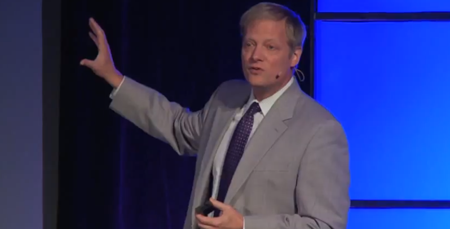
Renowned behavioral scientist and bestselling author, Brian Wansink, joined us at REACH 2012 to explain a common myth about obesity: buffets make us fat.
If buffets really make us fat, then why are there plenty of skinny people at a buffet? Wansink and his team sought to uncover what skinny people do differently than heavy people when facing a plethora of food. By identifying and replicating the behaviors of the successfully thin, we can combat our tendency to overeat.
By observing hundreds of buffet-goers, Wansink’s team found that skinny people did the following things:
- Sat 16 feet farther away from the buffet than heavy people
- Were 3 times more likely to face away from the food
- Were 3 times more likely to scout out the buffet before filling up their plate
- Ate off smaller plates
- Chewed 14 times on average, whereas heavy people chewed 11 times
Interestingly, when asked, most skinny people had no clue that they had behaved accordingly, further proving Wansink’s mantra that “the best diet is the diet you don’t know you’re on.”
So, how can we put this research into practice? In his twenty-minute BIG Idea speech, Wansink says it’s easier to change your environment than your mind. Instead of assuming you’ll have enough willpower to simply eat less when in an environment where gluttony is the goal, do as the skinny did and get rid of the things that will derail your diet.
Adopt these behaviors to cut calories at your next holiday party or buffet:
- Eat off a small plate
- Sit far from the food
- Sample the food choices before filling up your plate
The secret to mindless eating is not mindful eating. The solution is to change your environment so it works for you instead of against you.
Visit the VitalSmarts Video Channel and select Brian’s Mindless Eating Meets Influencer BIG Idea speech to learn how to cut calories.








I heard somehwere recently that a good principle goes bad when it becomes a “cause.” That resonated with me on a number of fronts. It seems applicable here. Taking care of the environment is a good principle. Who doesn’t want to have a pleasant and sustainable place to live. When it becomes a cause in itself, there is a lot of evil done in its name. Making a profit is a good goal to create a sustainable business and support the stakeholders. When it becomes an end, in itself, then it can lead to unethical and damaging behavior–including the destruction of the environment. So, in addition to keeping relationships at a high priority in these crucial conversations, it might be useful to question whether or not a good principle is being over-leveraged.